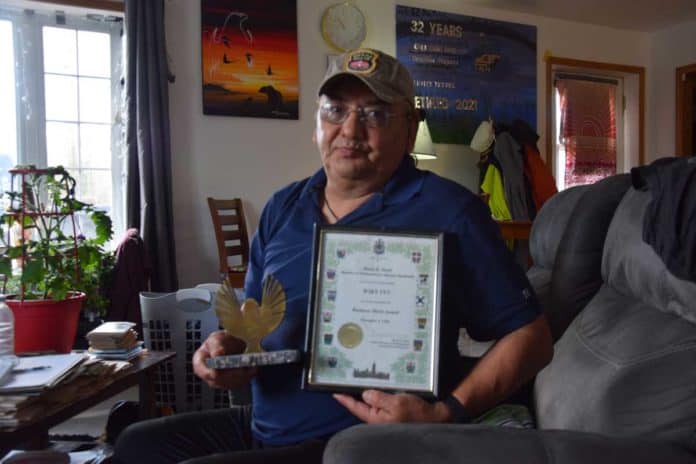MANITOULIN—Canada’s environmental job sector saw a five percent increase in 2020 with 35,000 net new jobs added, according to a March 2021 report by Eco Canada. That means one in 26 workers (689,000) were employed in the sector in Canada at the end of 2020, up from one in 30 for 2019. The updated forecast expects that environmental employment could increase by 17 percent to 2025 compared to 5.4 percent for Canada overall. Green career opportunities can be found across the country in most regions, industries and occupations.
For Amanda Stanger, Indigenous program manager with Relay Education, “a green career would be any occupation that involves environmental protection or conservation practices as a part of the work being conducted.” Programs Manager Abasi Sanders added, “a green career is a job where you help the planet and help yourself at the same time. There’s an impetus on helping the environment.”
Relay is a not-for-profit organization providing Canada-wide programming focused on renewable energy, conservation, climate change and green careers. It helps students learn about green career options and determine what path would be a good fit for them.
Careers trend from year to year, Ms. Stanger said. “Jobs in environmental protection tend to be of high interest. Resource conservation would probably be the second most popular area for green jobs. The third area would probably be renewable energy. That’s based on information from Eco Canada in 2018.” They’re seeing an increase in hybrid careers, she said. “For example, a skilled tradesperson who is also incorporating aspects of a green career such as an electrician who is also becoming a solar panel installer.”
Mr. Sanders pointed to an increase in sustainability managers for businesses due to a greater understanding of the principles of sustainability. A sustainability manager helps companies manage the transition to sustainability and then maintaining that sustainability, he said. “That’s going on all over the world because there’s a green movement that’s taking over. Millennials and younger adults seem to put more of their money towards environmental charities and causes. Caring more about the environment is a huge trend. It encapsulates climate change as well.”
The Eco Canada report found that green talent is needed in a variety of environmental fields, from air quality to natural resource management to environmental policy and legislation. According to the report, there are critical shortages expected of mechanical engineers, life science professionals, facility operation and maintenance managers, landscape architects, urban and land use planners, forest technologists and technicians, conservation and fisheries officers and utility equipment operators.
Generations ago careers usually followed family oriented practices, noted Ms. Stanger. “What’s really unique nowadays is you get to choose what you want to do. Why not do something that’s meaningful to you and meaningful to the environment? That’s something that really is a privilege that most of us don’t realize.”
Relay educators often come across youth who don’t know what they want to do, she said. Ms. Stanger and Mr. Sanders both ended up on career paths that were not what they originally thought they would be. “With education and learning about new things comes opportunity,” she said. Relay provides opportunities for students through workshops and various other programs that are unique to their organization. Pre-COVID, Ms. Stanger was responsible for Indigenous programming in the Sudbury-Manitoulin region but has expanded her range into more remote areas with the advent of virtual learning.
“We’ve done a suite of different programming in the Manitoulin area,” said Ms. Stanger. “The Kids World of Energy programs highlight renewable energy. Our workshops integrate hands-on components. We go into the classroom and now we teach virtually as well. We have a presentation and equipment that kids can use. We have experiments laid out so we can explore the different forms of renewable energy. We have a wind workshop and a solar workshop. In the wind workshop they explore a wind turbine and the size of the blades. They actually get to design and make their own and we have a design challenge at the end. We do the same kind of thing with solar energy. We talk about how it works and do a solar experiment and do a solar design challenge where they get to make their own solar cars. They really like that one because at the end they race them and actually find out which one is the best design. It’s really innovative.”
All Relay programs integrate curriculum links and are STEM oriented. Some of the more detailed programming includes job sharing, job shadowing and mentorships. In one partnership with Conestoga College for a solar learning program, students go to work on an actual project in their community to obtain hands on training.
“One of the most important components of the green careers workshop is a skills assessment where students basically find out what they like to do,” said Mr. Abasi. “After they fill out the skills assessment, they’re guided by the types of green careers that fit their skills and desires and that’s really a very important part of the workshop. It’s matching up what a student wants to do with a potential green career. It shows them what the opportunities are out there.”
Whether they are youth considering their first green career or adults transitioning into the environmental sector, soft skills are important to think about. People who have green hobbies should consider ways to translate those hobbies into careers. “Hobbies that are environmentally related give whoever is doing them some hands-on experience,” Ms. Stanger said. “They also allow us to network and find other people who share similar interests. Someone who has never thought about a green career but who has an interest in gardening can translate that into a job. There are a lot of soft skills you learn from gardening.” Soft skills include such things as social communication, problem solving and critical thinking. Technology is important as well, added Mr. Sanders.
Ms. Stanger has completed several tours in the Manitoulin area that were all focused on green careers workshops. “A tour is about one week long and we’ll go from school to school to school. We’ll have workshops at the same school, different classes and then go to neighbouring schools. We’ve reached out to a lot of schools in the public and Catholic boards and to First Nations schools on Manitoulin Island.”
Relay programs are generally in high demand but COVID has made this more difficult. Any institution (school, organization, club etc.) that is interested in having a virtual Green Collar Careers with Relay Education can register online at relayeducation.com/register/. They are currently offering fully subsidized workshops. A green careers quiz can be found online: relayeducation.com/programs/green-collar-careers.





